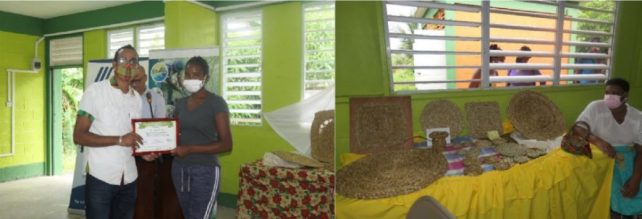
Almost 15 persons, including women and youth from the Petite Soufriére, San Sauveur and Good Hope communities of Dominica, successfully completed training in vetiver handicraft. This is an integral part of a project to strengthen coastal and marDominicaine climate resilience through upland and coastal ecosystem-based adaptation (EbA) and community engagement, funded by the Caribbean Biodiversity Fund (CBF) and executed by the Inter-American Institute for Cooperation on Agriculture (IICA).
In addition to Dominica, the IICA/CBF-EbA Project is being implemented in communities in Antigua & Barbuda, Saint Lucia and Trinidad & Tobago. The purpose of the training was to stimulate the establishment of sustainable green business development linked to green engineering solutions for land conservation within the community.
Between 27 July and 13 October 2021, the trainees, instructed by Vonnie Roudette, a seasoned handicraft trainer in the Caribbean, acquired new knowledge and skills in plaiting, business and other aspects of running a vetiver handicraft enterprise.
Despite the social distance challenges due to COVID-19, Roudette applauded the trainees for their commitment and took the opportunity to encourage them to put their newly acquired knowledge and skills to productive use.
Creating sustainable livelihoods from available community resources through skills building for self-reliance is an essential principle of the ecosystem-based adaptation approach to climate resilience. Strengthening community bonds through the experience of working together in the spirit of ‘coudeman’ is also traditional practice of community self-help and an important approach of the EbA project.
This is particularly important for the Petite Soufrière-San Sauveur and Good Hope communities. According to the Parliamentary Representative of the Castle Bruce Constituency, Octavia Paul, these communities ranked 3rd and 4th, respectively, among the 10 most physically vulnerable communities in Dominica based on a vulnerability survey conducted by the Climate Resilience Executing Agency of Dominica (CREAD).
In delivering the feature remarks, the Parliamentary Representative strongly confirmed that “this vetiver thing is not new to Dominica, is not an imported solution and the skills building is timely, occurring during Dominica’s Independence celebrations.” She urged the trainees and other community members to build back the traditional vetiver culture for land conservation and sustainable livelihoods through handicraft and other value-added products. She expressed her pleasure and pride at the handicraft products, telling the trainees that “you have acquired a new skill, which should be reflected in your own surroundings, which means that you have added value to yourself, your community and your country, and enhanced your own economic stability”.
The trainees were awarded with certificates of completion and their craft items were proudly displayed for participants at the event and viewing through live streaming. They were also provided with the basic tools required to continue their craftwork.
Also acknowledging the achievements of the trainees and the contributions of the EbA project at the event were the Permanent Secretary in the Ministry of Blue and Green Economy, Agriculture and National Food Security, Kyra Paul; Jonathan Barcant, Director of the IAMovement, the project partner responsible for the vetiver grass green engineering and green business interventions; Bernice Fontaine Mourillon, Chairperson of the Petite Soufrière-San Sauveur Village Council, the project’s community-based partner providing in-country community outreach support for project implementation, and IICA Representative for the Eastern Caribbean States, Gregg Rawlins.
About IICA
IICA is the specialized agency for agriculture in the Inter-American system, with a mission to encourage, promote and support its 34 Member States in their efforts to achieve agricultural development and rural well-being through international technical cooperation of excellence.

This is a commendable initiative. There are many other skills that could be revived, all of which utilize our natural resources.
On the other hand, as Luke Kelly of “Dubliners” fame sang:
Farewell to the besoms of heather and bloom,
Farewell to the creels and the basket.
The folks of today they would far sooner pay,
For a thing that’s been made out of plastic.